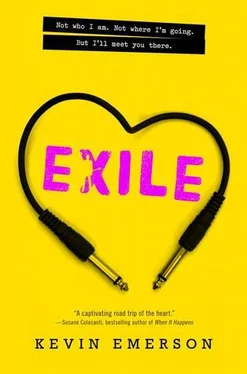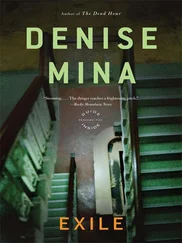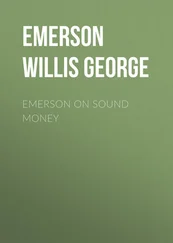The entrance is flanked by clusters of musicians shrouded in cigarette smoke. There’s every breed of band: hipsters in clutching T-shirts, pencil-thin jeans, and brightly colored sneakers; straight-up rockers, jeans torn and flannels ratty; metal bands, so many metal bands, with chains and hair and acne and sneers; a lost-looking trio of quirky kids who probably jam too much, clad in fez and tweed and thinking that anyone who plays a song shorter than five minutes is a slave to the corporate overlord. Everywhere, skin is tattooed and chins are rough with all manner of facial hair, most not quite successful. Passing among them is to suffer an onslaught of sweat and hair product and secondhand smoke.
I keep my eyes straight ahead. Musicians aren’t like jocks; they don’t catcall, they’re all too cool for that. But when it comes to ogling, I almost prefer jocks: they just dumbly assess your dimensions on some primal mating level, like we live on a savannah. You feel like they can’t even help themselves. Musicians, though, they judge you silently. Your coat. Your expression. The brand on your guitar case. Anything they can. Are you cooler than they are? Do you think you are? Are you the real thing? But you can’t be. There must be flaws. Let’s find them.
Inside, the claustrophobia increases. The air is stuffy, sour with pot and rank with body odor. As I move down the hall, there’s an acidic twinge of vomit and urine. Dangerheart’s room is on the fourth floor, up concrete stairs made uneven by years of gum deposits. The air is sticky with humanity, and everywhere there is the throbbing muffled pulse of bands, each room a cell in this musical organism, one riff bleeding into another as you pass each door.
I have to use the bathroom, but when I step inside, past the wild splatters of vomit and God-knows-what-else, and push open the only working stall door, I jump back at the sight of a girl making out with a guy.
She looks over her shoulder. “You need to go?” she asks mildly, her lips and eyes painted black.
“No, thanks. I’ll hold it.”
I hurry down the hall and pause outside door 418. I always arrive about halfway through practice, to give the guys time to bond, to get into it and let their guards down, to make their silly boy jokes. I feel like this is especially important since Caleb and I are dating. Arriving with him would be the girlfriend move. The manager isn’t arm candy. The manager checks in and evaluates. Though I do love hearing them play, and watching Caleb sing, I try not to show how much.
I press my ear to the door. It vibrates with each kick-drum beat. They’re crashing through a song called “Artificial Limb.” It’s frenetic and punkish, pretty fun but not quite there yet. I don’t know that it should be part of the set long term, but since they’re just starting out, getting a full set of decent songs is all that matters right now, and “Limb” is definitely decent.
I knock when they’re done and it’s Caleb who lets me in. We lock eyes and I wonder if this will be weird or cool, given our fight before, and whatever was clearly bothering him all day, but he greets me with a relaxed smile, and I do the same. We’re both in pro mode. We allow a brief hug, and I want more, but I hold it back. And yet just before the hug ends, he whispers in my ear: “Sorry about before.”
“Me too.” His hand lingers on my wrist as he pulls away, and it’s enough to get me through to Tina’s.
I drop down on the couch against the far wall. The Hive has a basement full of discarded furniture and busted amp cabinets, a sort of perpetual recycling system. When it comes to the couches, it’s take at your own risk. This one was once a bright-green-and-purple paisley, but it’s mostly a sort of moss color now, blotchy with stains, cigarette burns, and areas where the velour covering is almost completely worn away. I don’t even want to know what rooms this couch has been in, what’s happened on it, but we sprayed it with Lysol and Febreze and now it seems sanitary enough.
It’s not like the practice space is glamorous anyway. Jon thoughtfully strung some cool little globe lights across the ceiling, but they barely hide the water stains and cracks in the wall, and even if it looked great, it’s a windowless, ventless room, and nothing can stop the general boy smell. Still, there’s something special about it, because it’s the incubator where the music comes to life.
“How’s it going?” I ask.
“Pretty good,” says Caleb. “Just ran through everything. About to go again.”
“Cool.” I open my notebook.
“Uh-oh,” says Jon, “she’s getting out the ledger.”
“Come on,” I say with a smile, “this is what you pay me for.” I flip to my page of notes from last practice. In between scrawling doodles (not because I’m bored: I like to draw to the music, it helps me think), I have a short list of things to point out. I always like to let a practice go by before mentioning any critique to the band, as some things are just one-time issues, and work themselves out on their own.
They start with “Exit Strategy,” which is upbeat and hyper. It’s a little raw but sounds great.
Next is “Knew You Before.” This is my favorite song so far, and I think it could be a big hit. But as they play it, I hear the main issue that I wrote down last practice. Jon has this pedal board that Caleb nicknamed Mission Control. There are anywhere from five to ten multicolored pedals attached to it at a given practice, cables snaking between them, and he is constantly fidgeting with knobs and buttons. During “Knew You,” he keeps messing with a teal-blue pedal, and his guitar seems to waffle in and out of this time space.
I wait a moment after the song ends, and then say, “So, Jon, what are you going for with that spacey sound?” I’ve learned that Jon is the kind of person who responds to questions. He’s self-critical and will usually intuit what you’re getting at.
“You know,” says Jon with a shrug, already tweaking another dial, “a kind of ethereal wash. Like your arms are out and you’re spinning.”
“Ah.”
He looks up at me. “Was it too much?”
I shrug. “Maybe?” This is a good time to look to Caleb. I don’t mention my critiques to him before I say them, because then it would be like we were ganging up. Also, I try to notice if I’m suggesting something that the band totally doesn’t agree with, because if I am, it’s best to back off and take a different approach.
“It could maybe be a little more direct,” says Caleb.
“I liked when you had more fuzz on the riff in the verse,” Matt adds.
Jon sighs, but it’s not annoyed, rather a scientist hard at work. “Okay, I’ll dial back the tremolo, kick up the overdrive, see if I can make it a little more urgent.”
“Urgent is the perfect word,” I say.
They go through it again and it’s better, but I make sure to ask Jon, “What did you think of it like that?”
“Sure,” he says, “that could work.” Which is close enough to a yes from someone like Jon.
Next, they play “Chem Lab,” which is poppy and about crushing on your lab partner. Caleb’s lyrics are clever and fun: pipettes and titrates and love. But Matt has given it this really complicated beat: busy with lots of accents, when the song feels like it should just flow.
“Matt,” I say when it’s done, “that’s a really cool beat, but it kinda loses me.”
Matt’s eyes always light up when I say his name, except then he immediately looks away, down into the space between his floor tom and bass drum. “It’s just supposed to feel like a loop,” his says, disappointed.
Matt is tougher than Jon. He takes criticism personally, and he’s really proud of his beats. Drummers can get really focused on the sixteenth notes of a song, rather than the song as a whole. But I’ve figured out something that usually works with Matt.
Читать дальше












